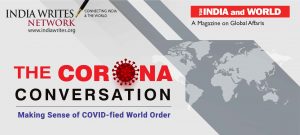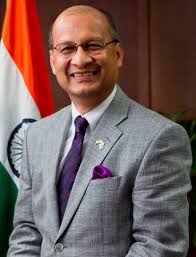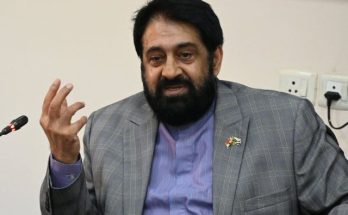The coronavirus pandemic has spawned new geopolitical equations and rivalries, thereby fuelling speculation about a new world order that could reflect the emerging power shifts. Against this backdrop of the geopolitical churn in the wake of the coronavirus crisis, Vishnu Prakash, an ex-diplomat who served as spokesperson of India’s Ministry of External Affairs, outlines the contours of the post-corona world order and sums up major trends that will mark the beginning of a new post-Covid world.
In this conversation with Manish Chand, Editor-in-Chief, India and World & India Writes Network, Prakash, India’s former Ambassador to South Korea and Canada, says that India’s prompt medical assistance to countries around the world has reinforced its image as a reliable friend and partner.
Q & A
Q) In what ways the COVID-crisis will help shape a new world order? What will be key features of this post-corona world order?
A) Experts had warned about an influenza break-out. But few had imagined a Covid-19 type pandemic, which is unprecedented in severity, scope, disruptiveness and impact. Looking ahead to the post-corona world order, it’s hard to say for sure, but some trends are becoming visible.
One, China is likely to emerge as the biggest loser. China’s credibility, which was shaky at best, has taken a big hit, for hiding the contagion, causing 150,000 deaths (mostly in the western countries) and pushing the world into a deep recession.
Two, manufacturing facilities especially of sensitive or critical products, pertaining to health, food and telecom security, will move out of China to home countries. Three, international trade, commerce and capital flows would take a hit. Four, protectionist walls will go up; societies could become nationalistic and the role of governments would be strengthened. Five, the US-led regional security architecture could come under stress as Washington turns inwards. Concerned nations could be compelled to strengthen their own military capabilities, resulting in an arms race.
Six, geopolitical strategic equations would undergo a review and possible recalibration. Seven, international institutions which are seen as partial and ineffective, will weaken further.
Lastly, the work-from-home culture would spread and the popularity of cyber meeting sites and ecommerce platforms would grow. In sum, the post Covid-19 world will mark the beginning of a new era.
Q) You served as India’s Ambassador to South Korea. How do you look at South Korea’s success in containing the COVID-19 pandemic? In what ways India and South Korea can cooperate closely in curbing this deadly pandemic?
A) South Korea was a little slow to react and even today has not banned flights from China, except from Wuhan. But once the government swung into action, they aggressively tested a sizeable percentage of the population under the 3T or “test, trace and treat” strategy. Individuals afflicted by the virus were quickly identified, isolated and treated. It helped that Korea has a literate and disciplined populace of just 51 million. By March-end, they conducted over 300,000 tests, free of charge.
South Korea and India have been cooperating and sharing experiences on handling the pandemic, especially by leveraging the power of technology. Indian companies have also been sourcing medical supplies from South Korea, including Covid-19 testing kits.
Q) India has taken significant diplomatic initiatives like the SAARC virtual conference for enhancing regional and international cooperation in addressing the pandemic crisis. What else can India do by way of expanding global cooperation to address multifarious issues arising out of the COVID-19 crisis.
A) India’s image as a reliable friend and partner, even in the times of crises, has been further burnished. The post Covid-19 world will face a whole range of challenges, some of which have been outlined above. Constructive plurilateral cooperation would expedite recovery and mitigate hardship. India is well placed to encourage the international community to do so, and could lead by example especially in the Indo-Pacific region.

About The Corona Conversation
Anchored by India Writes Network and India and the World magazine, The Corona Conversation explores global, diplomatic and geopolitical ramifications of the coronavirus pandemic with eminent diplomats, experts and thought leaders. The interview series focuses on pressing questions of the time, including the shape of a post-COVID world and a new kind of diplomacy that is needed to address and mitigating the human tragedy of this magnitude.
Author Profile
- India Writes Network (www.indiawrites.org) is an emerging think tank and a media-publishing company focused on international affairs & the India Story. Centre for Global India Insights is the research arm of India Writes Network. To subscribe to India and the World, write to editor@indiawrites.org. A venture of TGII Media Private Limited, a leading media, publishing and consultancy company, IWN has carved a niche for balanced and exhaustive reporting and analysis of international affairs. Eminent personalities, politicians, diplomats, authors, strategy gurus and news-makers have contributed to India Writes Network, as also “India and the World,” a magazine focused on global affairs.
Latest entries
 DiplomacyJanuary 5, 2026India walks diplomatic tightrope over US operation in Venezuela
DiplomacyJanuary 5, 2026India walks diplomatic tightrope over US operation in Venezuela India and the WorldNovember 26, 2025G20@20: Africa’s Moment – The Once and Future World Order
India and the WorldNovember 26, 2025G20@20: Africa’s Moment – The Once and Future World Order DiplomacyOctober 4, 2025UNGA Resolution 2758 Must Not Be Distorted, One-China Principle Brooks No Challenge
DiplomacyOctober 4, 2025UNGA Resolution 2758 Must Not Be Distorted, One-China Principle Brooks No Challenge India and the WorldJuly 26, 2025MPs, diplomats laud Operation Sindoor, call for national unity to combat Pakistan-sponsored terror
India and the WorldJuly 26, 2025MPs, diplomats laud Operation Sindoor, call for national unity to combat Pakistan-sponsored terror








